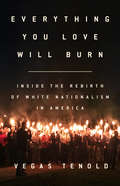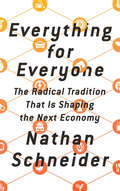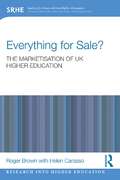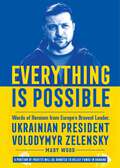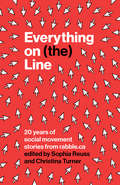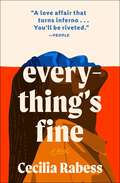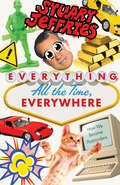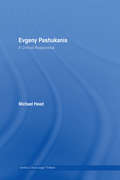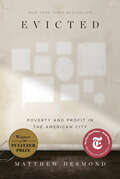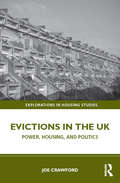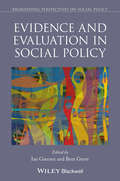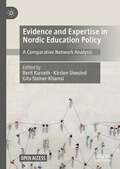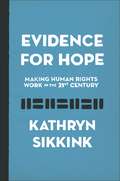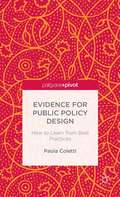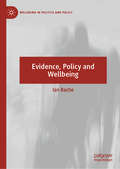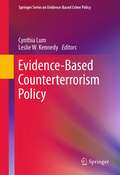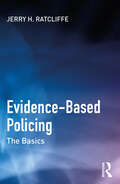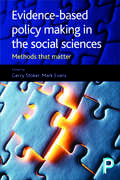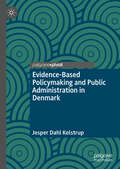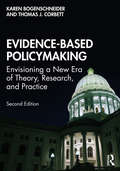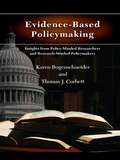- Table View
- List View
Everything You Love Will Burn: Inside the Rebirth of White Nationalism in America
by Vegas TenoldThe dark story of the shocking resurgence of white supremacist and nationalist groups, and their path to political powerSix years ago, Vegas Tenold embedded himself among the members of three of America's most ideologically extreme white nationalist groups-the KKK, the National Socialist Movement, and the Traditionalist Workers Party. At the time, these groups were part of a disorganized counterculture that felt far from the mainstream.But since then, all that has changed. Racially-motivated violence has been on open display at rallies in Charlottesville, Berkeley, Pikesville, Phoenix, and Boston. Membership in white nationalist organizations is rising, and national politicians, including the president, are validating their perceived grievances.Everything You Love Will Burn offers a terrifying, sobering inside look at these newly empowered movements, from their conventions to backroom meetings with Republican operatives. Tenold introduces us to neo-Nazis in Brooklyn; a millennial Klanswoman in Tennessee; and a rising star in the movement, nicknamed the "Little Führer" by the Southern Poverty Law Center, who understands political power and is organizing a grand coalition of far-right groups to bring them into the mainstream.Everything You Love Will Burn takes readers to the dark, paranoid underbelly of America, a world in which the white race is under threat and the enemy is everywhere.
Everything for Everyone: The Radical Tradition That Is Shaping the Next Economy
by Nathan SchneiderThe origins of the next radical economy is rooted in a tradition that has empowered people for centuries and is now making a comeback.A new feudalism is on the rise. While monopolistic corporations feed their spoils to the rich, more and more of us are expected to live gig to gig. But, as Nathan Schneider shows, an alternative to the robber-baron economy is hiding in plain sight; we just need to know where to look.Cooperatives are jointly owned, democratically controlled enterprises that advance the economic, social, and cultural interests of their members. They often emerge during moments of crisis not unlike our own, putting people in charge of the workplaces, credit unions, grocery stores, healthcare, and utilities they depend on.Everything for Everyone chronicles this revolution--from taxi cooperatives keeping Uber at bay, to an outspoken mayor transforming his city in the Deep South, to a fugitive building a fairer version of Bitcoin, to the rural electric co-op members who are propelling an aging system into the future. As these pioneers show, co-ops are helping us rediscover our capacity for creative, powerful, and fair democracy.
Everything for Sale: The Virtues and Limits of Markets
by Robert KuttnerThere's a battle raging inside and outside the halls of Congress for the economic hearts and minds of America. "Reduce the size of big government! Less regulation! Privatization! Market economy!"
Everything for Sale? The Marketisation of UK Higher Education: The Marketisation Of Uk Higher Education (Research into Higher Education)
by Roger Brown Helen CarassoThe marketisation of higher education is a growing worldwide trend. Increasingly, market steering is replacing or supplementing government steering. Tuition fees are being introduced or increased, usually at the expense of state grants to institutions. Grants for student support are being replaced or supplemented by loans. Commercial rankings and league tables to guide student choice are proliferating with institutions devoting increasing resources to marketing, branding and customer service. The UK is a particularly good example of this, not only because it is a country where marketisation has arguably proceeded furthest, but also because of the variations that exist as Scotland, Wales and Northern Ireland increasingly diverge from England. In Everything for Sale, Roger Brown argues that the competitive regime that is now applicable to our Higher Education system was the logical, and possibly inevitable, outcome of a process that began with the introduction of full cost fees for overseas students in 1980. Through chapters including: Markets and Non-Markets The Institutional Pattern of Provision The Funding of Research The Funding of Student Education Quality Assurance The Impact of Marketisation: Efficiency, diversity and equity; He shows how the evaluation and funding of research, the funding of student education, quality assurance, and the structure of the system have increasingly been organised on market or quasi-market lines. As well as helping to explain the evolution of British higher education over the past thirty years, the book contains some important messages about the consequences of introducing or extending market competition in universities’ core activities of teaching and research. This timely and comprehensive book is essential reading for all academics at University level and anyone involved in Higher Education policy.
Everything is Possible: Words of Heroism from Europe's Bravest Leader, Ukrainian President Volodymyr Zelensky
by Mary Wood*A portion of profits will be donated to relief funds in Ukraine*"When you attack us, you will see our faces, not our backs, but our faces." —Volodymyr Zelensky, hours before Russian Autocrat Vladmir Putin invaded Ukraine&“Glory to Ukraine&” isn&’t a greeting, it&’s a calling. Ukrainian President Volodymyr Zelensky is the unexpected leader of a generation, one whose unwavering strength rallied everyday citizens to defend their homes, take to the streets, and fight for their independence. Everything is Possible is a collection of President Zelensky&’s most powerful words of bravery, demand for grit, and declarations for peace.On the pages of this book, you&’ll find the unshakable conviction of a leader who stands up not just for his people, but for the future of all people throughout the world. President Zelensky&’s fierce sense of duty and steadfast faith in a better tomorrow are reminders that Ukraine&’s values are human values. Find humility, strength, and compassion in the guiding force whose full-throated, full-hearted leadership shook the world awake. Glory to the heroes. Read through nearly 150 moving quotes on courage, unity, and freedomFind inspiration in the Ukrainian president&’s unrelenting force, determination, and decencyBe encouraged by the humanity and resolve that can be found in the darkest of times
Everything on (the) Line: 20 Years of Social Movement Stories from rabble.ca
by Sophia Reuss Christina TurnerOn a chilly April day in 2001, some 75,000 protesters flooded the streets of Quebec City to denounce corporate globalization and a neoliberal trade deal. From that wellspring of activist anger, energy, and hope came the founding of rabble.ca: an alternative news source and community space that reported on Canadian politics from the ground, catching the attention of journalists and activists across the country. Since then, Canada has seen the rise of Harper Conservatism and its replacement by a Liberal government; a decline in union power; the stalled beginnings of reconciliation with Indigenous nations; the birth of Black Lives Matter; an invigorated climate justice movement; and more. These stories of activist struggle lie at the heart of Everything on (the) Line, a collection of rabble’s most incisive articles from the past twenty years. Editors S. Reuss and Christina Turner guide readers deftly through rabble’s deep and storied archives, combining critical analysis with new essays from celebrated activists and writers such as Russell Diabo, Nora Loreto, Phillip Dwight Morgan, and Monia Mazigh. Each vital selection marks a flashpoint in Canadian politics—and an opportunity to reflect on the social movements that have challenged capitalism, racism, settler colonialism, and patriarchy over the past two decades.
Everything's Fine
by Cecilia Rabess&“Does love conquer all? Does it now? Did it ever? These are questions Cecilia Rabess asks in her nimble, discerning debut…The ending of Everything&’s Fine is one of the best I&’ve read in years.&” —The New York TimesA painfully funny, painfully real love story for our time that doesn&’t just ask will they, but…should they?Jess is a senior in college, ambitious but aimless, when she meets Josh. He&’s a privileged preppy in chinos, ready to inherit the world. She&’s not expecting to inherit anything.A year later, they&’re both working at the same investment bank. And when Jess finds herself the sole Black woman on the floor, overlooked and underestimated, Josh shows up for her in surprising—if imperfect—ways. Before long, an unlikely friendship forms, tinged with undeniable chemistry. It gradually, and then suddenly, turns into an electrifying romance that shocks them both.Despite their differences, the force of their attraction propels the relationship forward. But as the cultural and political landscape shifts underneath them, Jess is forced to consider if their disagreements run deeper than she can bear, what she&’s willing to compromise for love, and whether, in fact, everything&’s fine.A stunning debut about &“a love affair that turns inferno&” (People), that is &“extraordinarily brave…funny as hell,&” (Zakiya Dalilah Harris) Cecilia Rabess&’s Everything&’s Fine is an incisive and moving portrait of a young woman who is just beginning to discover who she is and who she has the right to be. It is also a &“subtle, ironic, wise, state-of-the-nation novel&” (Nick Hornby) that asks big questions about the way we live now and &“whether our choices stop and end with us&” (The New York Times).
Everything, All the Time, Everywhere: How We Became Postmodern
by Stuart JeffriesA radical new history of a dangerous ideaPost-Modernity is the creative destruction that has shattered our present times into fragments. It dynamited modernism which had dominated the western world for most of the 20th century. Post-modernism stood for everything modernism rejected: fun, exuberance, irresponsibility. But beneath its glitzy surface, post-modernism had a dirty secret: it was the fig leaf for a rapacious new kind of capitalism. It was also the forcing ground of the 'post truth', by means of which western values got turned upside down.But where do these ideas come from and how have they impacted on the world? In his brilliant history of a dangerous idea, Stuart Jeffries tells a narrative that starts in the early 1970s and continue to today. He tells this history through a riotous gallery that includes David Bowie, the Ipod, Frederic Jameson, the demolition of Pruit-Igoe, Madonna, Post-Fordism, Jeff Koon's 'Rabbit', Deleuze and Guattari, the Nixon Shock, The Bowery series, Judith Butler, Las Vegas, Margaret Thatcher, Grand Master Flash, I Love Dick, the RAND Corporation, the Sex Pistols, Princess Diana, the Musee D'Orsay, Grand Theft Auto, Perry Anderson, Netflix, 9/11We are today scarcely capable of conceiving politics as a communal activity because we have become habituated to being consumers rather than citizens. Politicians treat us as consumers to whom they must deliver. Can we do anything else than suffer from buyer's remorse?
Evgeny Pashukanis: A Critical Reappraisal (Nomikoi: Critical Legal Thinkers)
by Michael HeadA thorough examination of Pashukanis’ writings, this book is a significant contribution to a proper assessment of Pashukanis’ work, the value of his theoretical legacy and the contemporary relevance of Marxist legal theory. Interest in the best-known Soviet legal scholar, Evgeny Pashukanis, remains widespread and his work retains considerable relevance. His writings provide a rich source of material on the Marxist theory of law and the state, as well as the attempts to apply that doctrine in Soviet Russia. In this book, Michael Head considers Pashukanis’ work both within its historical context and in relation to contemporary legal theory, answering a range of questions including: How and why did Pashukanis emerge as the pre-eminent Soviet jurist from 1924 to 1930? Why did he come under only minor criticism from 1930 to 1936 and then be denounced and executed in 1937 as a 'Trotskyite saboteur'? Why have many Western scholars generally praised the quality and originality of Pashukanis’ work, yet also drawn the conclusion that his fate illustrates the intrinsic impossibility of the entire communist project? Serving as an introduction to Pashukanis and Marxist legal theory and a timely contribution in light of the universal assault on civil liberties in the indefinite 'War on Terror' and the constant escalation of 'law and order' measures in Western societies, this volume is an invaluable resource for those interested in jurisprudence and critical thought.
Evicted from Eternity: The Restructuring of Modern Rome
by Michael HerzfeldModern Rome is a city rife with contradictions. Once the seat of ancient glory, it is now often the object of national contempt. It plays a significant part on the world stage, but the concerns of its residents are often deeply parochial. And while they live in the seat of a world religion, Romans can be vehemently anticlerical. These tensions between the past and the present, the global and the local, make Rome fertile ground to study urban social life, the construction of the past, the role of religion in daily life, and how a capital city relates to the rest of the nation. Michael Herzfeld focuses on Rome's historic Monti district and the wrenching dislocation caused by rapid economical, political, and social change. Evicted from Eternity tells the story of the gentrification of Monti- once the architecturally stunning home of a community of artisans and shopkeepers now displaced by an invasion of rapacious real estate speculators, corrupt officials, dithering politicians, deceptive clerics, and shady thugs. As Herzfeld picks apart the messy story of Monti's transformation, he ranges widely over many aspects of life there and in the rest of the city, richly depicting the uniquely local landscape of globalization in Rome.
Evicted: Poverty and Profit in the American City
by Matthew DesmondNEW YORK TIMES BESTSELLER • WINNER OF THE PULITZER PRIZE • ONE OF TIME&’S TEN BEST NONFICTION BOOKS OF THE DECADE • ONE OF THE NEW YORK TIMES&’S 100 BEST BOOKS OF THE 21ST CENTURY One of the most acclaimed books of our time, this modern classic &“has set a new standard for reporting on poverty&” (Barbara Ehrenreich, The New York Times Book Review).In Evicted, Princeton sociologist and MacArthur &“Genius&” Matthew Desmond follows eight families in Milwaukee as they each struggle to keep a roof over their heads. Hailed as &“wrenching and revelatory&” (The Nation), &“vivid and unsettling&” (New York Review of Books), Evicted transforms our understanding of poverty and economic exploitation while providing fresh ideas for solving one of twenty-first-century America&’s most devastating problems. Its unforgettable scenes of hope and loss remind us of the centrality of home, without which nothing else is possible. A BEST BOOK OF THE YEAR: President Barack Obama, The New York Times Book Review, The Boston Globe, The Washington Post, NPR, Entertainment Weekly, The New Yorker, Bloomberg, Esquire, BuzzFeed, Fortune, San Francisco Chronicle, Milwaukee Journal Sentinel, St. Louis Post-Dispatch, Politico, The Week, Chicago Public Library, BookPage, Kirkus Reviews, Library Journal, Publishers Weekly, Booklist, Shelf AwarenessWINNER OF: The National Book Critics Circle Award for Nonfiction • The PEN/John Kenneth Galbraith Award for Nonfiction • The Andrew Carnegie Medal for Excellence in Nonfiction • The Hillman Prize for Book Journalism • The PEN/New England Award • The Chicago Tribune Heartland PrizeFINALIST FOR THE LOS ANGELES TIMES BOOK PRIZE AND THE KIRKUS PRIZE&“Evicted stands among the very best of the social justice books.&”—Ann Patchett, author of Bel Canto and Commonwealth &“Gripping and moving—tragic, too.&”—Jesmyn Ward, author of Salvage the Bones &“Evicted is that rare work that has something genuinely new to say about poverty.&”—San Francisco Chronicle
Evictions in the UK: Power, Housing, and Politics (Explorations in Housing Studies)
by Joe CrawfordEvictions in the UK examines the relationships between tenants, landlords, housing providers and government agencies and the tensions and conflicts that characterise these relations. The book shows how power dynamics are being reconfigured in the post-welfare context of the first quarter of the 21st century, as evictions for rent arrears are becoming one of the most significant threats to both the wellbeing of the social housing sector and the welfare of its tenants. Embracing both practical and critical approaches, this book offers a comprehensive understanding of the contradictory and thus controversial issue of evictions. It explores the range of perspectives involved in the practice – landlords carrying out evictions, those agencies providing legal assistance to evictees, as well as academics and institutions charged with researching and regulating the process. Drawing on three case studies relating to evictions across Scotland and England, this book provides a comprehensive look at the punitive consequences of poverty (evictions for rent arrears) and status (evictions under immigration law) that are applicable to social housing systems worldwide. Based on original, primary-source data, this book will be a key resource for academics and students as well as policy makers and practitioners in the fields of housing studies, planning, social welfare, and political sociology.
Evidence and Evaluation in Social Policy (Broadening Perspectives in Social Policy)
by Ian Greener Bent GreveBy examining the role of evidence in social policymaking and the extent of its influence, Evidence and Evaluation in Social Policy delves deeply into one of the central questions of the field for the last 20 years. Chronicles the trend towards evidence-based policy over the last decade Assesses the ways in which scarce resources can best be used for the best care, particularly in times of austerity Describes methodological innovation, the ways in which researchers and politicians are working together effectively, and suggestions for future improvement Covers topics such as the role of randomized controlled trials in shaping public policy; the pitfalls of evidence-based policy as a prescriptive ideal; the challenges of measuring public support for policy interventions; and the benefits of engaging local government decision-makers with evaluation research
Evidence and Expertise in Nordic Education Policy: A Comparative Network Analysis
by Gita Steiner-Khamsi Berit Karseth Kirsten SivesindThis open access book explores how policy makers draw on national, regional and international expertise in issuing school reform within five Nordic countries. In an era of international comparison, policy makers are expected to review best practices, learn from experiences from elsewhere, and apply international standards propelled by international organizations. Do they do so? What counts, for them, as evidence and expertise? The chapters draw methodologically on bibliometric data, network analysis, document analysis and expert interviews. They show compellingly how governments use “evidence” strategically and selectively for agenda setting and policy decisions. This book will be of interest and value to scholars of education policy, specifically within the Nordic region, and international and comparative education.
Evidence for Hope: Making Human Rights Work in the 21st Century
by Kathryn SikkinkA history of the successes of the human rights movement and a case for why human rights workEvidence for Hope makes the case that, yes, human rights work. Critics may counter that the movement is in serious jeopardy or even a questionable byproduct of Western imperialism. They point out that Guantánamo is still open, the Arab Spring protests have been crushed, and governments are cracking down on NGOs everywhere. But respected human rights expert Kathryn Sikkink draws on decades of research and fieldwork to provide a rigorous rebuttal to pessimistic doubts about human rights laws and institutions. She demonstrates that change comes slowly and as the result of struggle, but in the long term, human rights movements have been vastly effective.Attacks on the human rights movement’s credibility are based on the faulty premise that human rights ideas emerged in North America and Europe and were imposed on developing southern nations. Starting in the 1940s, Latin American leaders and activists were actually early advocates for the international protection of human rights. Sikkink shows that activists and scholars disagree about the efficacy of human rights because they use different yardsticks to measure progress. Comparing the present to the past, she shows that genocide and violence against civilians have declined over time, while access to healthcare and education has increased dramatically. Cognitive and news biases contribute to pervasive cynicism, but Sikkink’s investigation into past and current trends indicates that human rights is not in its twilight. Instead, this is a period of vibrant activism that has made impressive improvements in human well-being.Exploring the strategies that have led to real humanitarian gains since the middle of the twentieth century, Evidence for Hope looks at how these essential advances can be supported and sustained for decades to come.
Evidence for Public Policy Design: How to Learn from Best Practice
by Paola ColettiLearning from the successes and failures of others is a necessity in the field of public sector innovation. This book develops guidelines for policymakers, practitioners and policy analysts to understand what drives policy success and to transfer innovations from a source case to a target case with a view to assisting effective policy design.
Evidence, Policy and Wellbeing (Wellbeing in Politics and Policy)
by Ian BacheThis book analyses the role of evidence in taking wellbeing from an issue that has government attention to one that leads to significant policy change. In doing so, it draws on contributions from political science, policy theory and literature specifically on the evidence and policy relationship. The book has three main aims: to understand the role of evidence in shaping the prospects for wellbeing in public policy; to inform the barriers literature on the use of evidence in policy; and, to inform the multiple streams approach (MSA) to agenda-setting. While the book focuses on developments at UK government level, a number of the findings and arguments presented here have wider significance, both in relation to wellbeing developments elsewhere and to the theoretical literatures on agenda-setting and evidence use. The book draws on insights from interviews with policy-makers and stakeholders that were undertaken as part of the work of the Community Wellbeing Evidence Programme of the What Works Centre for Wellbeing.
Evidence, Politics, and Education Policy
by Lorraine M. McDonnell M. Stephen WeatherfordIn Evidence, Politics, and Education Policy, political scientists Lorraine M. McDonnell and M. Stephen Weatherford provide an original analysis of evidence use in education policymaking to help scholars and advocates shape policy more effectively. The book shows how multiple types of evidence are combined as elected officials and their staffs work with researchers, advocates, policy entrepreneurs, and intermediary organizations to develop, create, and implement education policies.Evidence, Politics, and Education Policy offers an in-depth understanding of the political environment in which evidence is solicited and used. Two key case studies inform the book&’s findings. The primary case—a major, multimethod study—examines the development and early implementation of the Common Core State Standards at the national level and in four states: California, Indiana, Massachusetts, and Tennessee. A comparative case analyzes the evidence used in Congressional hearings over the twenty-year history of the Children&’s Health Insurance Program. Together, the two cases illustrate the conditions under which different types of evidence are used and, in particular, how federalism, the complexity of the policy problem, and the policy&’s maturity shape evidence use.McDonnell and Weatherford focus on three leverage points for strengthening the use of research evidence in education policy: integrating research findings with value-based policy ideas; designing policies with incentives for research use built into their rules and organizational structures; and training policy analysts to promote the use of research in policymaking venues.
Evidence-Based Counterterrorism Policy
by Leslie W. Kennedy Cynthia LumIn the past eight years, there has been a massive increase in government spending on counterterrorism intervention development and implementation. Given this increase, there are two evidence-based policy questions that are important to address: Is there evidence that any of these programs are effective - in other words, can they be shown to be linked to reducing terrorism, terrorist recruiting, or to improving the response and management of terrorist events? Do these interventions have secondary or collateral effects that may be costly, harmful, illegal, beneficial, or otherwise? As Lum and Kennedy discovered in an evaluation research on counterterrorism interventions, only a minuscule number of empirical studies of terrorism exist and there is an almost complete absence of evaluation research on counter-terrorism strategies. This is startling given the enormous increases in the development and use of counter-terrorism programs, as well as spending on counter-terrorism activity. Even more disconcerting was the nature of the evaluations we did find; some programs were shown to either have no discernible effect on terrorism or lead to increases in terrorism. The emphasis of the need for empirical research in evaluating interventions and informing policy cannot be overstated, and is the primary goal of Evidence-Based Counterterrorism Policy.
Evidence-Based Policing: The Basics
by Jerry H. RatcliffeWhat is evidence-based policing and how is it done? This book provides an answer to both questions, offering an introduction for undergraduate students and a hands-on guide for police officers wanting to know how to put principles into practice. It serves as a gentle introduction to the terminology, ideas, and scientific methods associated with evidence-based policy, and outlines some of the existing policing applications. A couple of introductory chapters summarize evidence-based policy and its goals and origins. The core of the book eases the reader through a range of practical chapters that answer questions many people have about evidence-based practice in policing. What does good science look like? How do I find reliable research? How do I evaluate research? What is a hypothesis? How do randomized experiments work? These chapters not only provide a practical guide to reading and using existing research, but also a roadmap for readers wanting to start their own research project. The final chapters outline different ways to publish research, discuss concerns around evidence-based policing, and ask what is in the future for this emerging field. Annotated with the author’s own experiences as a police officer and researcher, and filled with simple aids, flowcharts, and figures, this practical guide is the most accessible introduction to evidence-based policing available. It is essential reading for policing students and police professionals alike. Further resources are available on the book’s website at evidencebasedpolicing.net.
Evidence-Based Policing: The Basics
by Jerry H. RatcliffeWhat is evidence-based policing and how is it done? This book provides an answer to both questions, offering an introduction for undergraduate students and a hands-on guide for police officers wanting to know how to put principles into practice. It serves as a gentle introduction to the terminology, ideas, and scientific methods associated with evidence-based policy, and outlines some of the existing policing applications. A couple of introductory chapters summarize evidence-based policy and its goals and origins. The core of the book eases the reader through a range of practical chapters that answer questions many people have about evidence-based practice in policing. What does good science look like? How do I find reliable research? How do I evaluate research? What is a hypothesis? How do randomized experiments work? These chapters not only provide a practical guide to reading and using existing research, but also a roadmap for readers wanting to start their own research project. The final chapters outline different ways to publish research, discuss concerns around evidence-based policing, and ask what is in the future for this emerging field. Annotated with the author’s own experiences as a police officer and researcher, and filled with simple aids, flowcharts, and figures, this practical guide is the most accessible introduction to evidence-based policing available. It is essential reading for policing students and police professionals alike. Further resources are available on the book’s website at evidencebasedpolicing.net.
Evidence-Based Policy Making in the Social Sciences: Methods That Matter
by Gerry Stoker and Mark EvansDrawing on the insights of some of the world’s leading authorities in public policy analysis, this important book offers a distinct and critical showcase of emerging forms of discovery for policy-making. Chapter by chapter this expert group of social scientists showcase their chosen method or approach, showing the context, the method’s key features and how it can be applied in practice, including the scope and limitations of its application and value to policy makers. Arguing that it is not just econometric analysis, cost benefit or surveys that can do policy work, the contributors demonstrate a range of other methods that can provide evidenced-based policy insights and how they can help facilitate progressive policy outcomes. The book will be ideal for upper level undergraduate students as well as Public Policy post-graduates, and can be used as the basis of an intensive learning experience for policy makers.
Evidence-Based Policymaking and Public Administration in Denmark
by Jesper Dahl KelstrupThis book explores the use of evidence in different government ministries, and how it affects policy success and failure in Denmark. It analyses the ways in which public administrators collect and link evidence to policy-making in the areas of employment and primary education, highlighting how ministers in the two policy areas utilise evidence in varying ways. Denmark makes a particularly interesting case study, characterised by a strong administrative capacity for evidence use. The book also offers important insights into evidence-based policymaking in a non-Anglophone context. It will appeal to scholars and students of public administration and public policy.
Evidence-Based Policymaking: Envisioning a New Era of Theory, Research, and Practice
by Karen Bogenschneider Thomas CorbettNew thinking is needed on the age-old conundrum of how to connect research and policymaking. Why does a disconnect exist between the research community, which is producing thousands of studies relevant to public policy, and the policy community, which is making thousands of decisions that would benefit from research evidence? The second edition updates community dissonance theory and provides an even stronger, more substantiated story of why research is underutilized in policymaking, and what it will take to connect researchers and policymakers. This book offers a fresh look into what policymakers and the policy process are like, as told by policymakers themselves and the researchers who study and work with them. New to the second edition: • The point of view of policymakers is infused throughout this book based on a remarkable new study of 225 state legislators with an extraordinarily high response rate in this hard-to-access population. • A new theory holds promise for guiding the study and practice of evidence-based policy by building on how policymakers say research contributes to policymaking. • A new chapter features pioneering researchers who have effectively influenced public policy by engaging policymakers in ways rewarding to both. • A new chapter proposes how an engaged university could provide culturally competent training to create a new type of scholar and scholarship. This review of state-of-the-art research on evidence-based policy is a benefit to readers who find it hard to keep abreast of a field that spans the disciplines of business, economics, education, family sciences, health services, political science, psychology, public administration, social work, sociology, and so forth. For those who study evidence-based policy, the book provides the basics of producing policy relevant research by introducing researchers to policymakers and the policy process. Strategies are provided for identifying research questions that are relevant to the societal problems that confront and confound policymakers. Researchers will have at their fingertips a breath-taking overview of classic and cutting-edge studies on the multi-disciplinary field of evidence-based policy. For instructors, the book is written in a language and style that students find engaging. A topic that many students find mundane becomes germane when they read stories of what policymakers are like, and when they learn of researcher’s tribulations and triumphs as they work to build evidence-based policy. To point students to the most important ideas, the key concepts are highlighted in text boxes. For those who desire to engage policymakers, a new chapter summarizes the breakthroughs of several researchers who have been successful at driving policy change. The book provides 12 innovative best practices drawn from the science and practice of engaging policymakers, including insights from some of the best and brightest researchers and science communicators. The book also takes on the daunting task of evaluating the effectiveness of efforts to engage policymakers around research. A theory of change identifies seven key elements that are fundamental to increasing policymaker’s use of research along with evaluation protocols and preliminary evidence on each element.
Evidence-Based Policymaking: Insights from Policy-Minded Researchers and Research-Minded Policymakers
by Karen Bogenschneider Thomas J. CorbettThis book is for those who believe that good government should be based on hard evidence, and that research and policy ought to go hand-in-hand. Unfortunately, no such bond exists. Rather, there is a substantial gap, some say chasm, between the production of knowledge and its utilization. Despite much contrary evidence, the authors propose there is a way of doing public policy in a more reflective manner, and that a hunger for evidence and objectivity does exist. The book is pragmatic, drawing on advice from some of the best and brightest informants from both the research and policy communities. In their own voices, researchers provide incisive analysis about how to bridge the research/policy divide, and policymakers provide insights about why they use research, what kind is most useful, where they seek it, and how they screen its quality. The book breaks through stereotypes about what policymakers are like, and provides an insiders’ view of how the policy process really works. Readers will learn what knowledge, skills, approaches, and attitudes are needed to take research findings from the laboratory to lawmaking bodies, and how to evaluate one’s success in doing so. The book’s balance between theory and practice will appeal to students in graduate and upper-level undergraduate courses in family studies and family policy, educational policy, law, political science, public administration, public health, social work, and sociology. This book will also be of interest to researchers who want to bring their ideas into policy debate and to those who work with policymakers to advance an evidence-based policy agenda.
